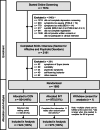A randomized controlled trial of a therapist-guided online intervention for depressed adults and its utility as an adjunctive to antidepressants and psychotherapy
- PMID: 39934725
- PMCID: PMC11817706
- DOI: 10.1186/s12888-025-06564-2
A randomized controlled trial of a therapist-guided online intervention for depressed adults and its utility as an adjunctive to antidepressants and psychotherapy
Abstract
Background: Internet-based interventions (IBIs) are a low-threshold treatment for individuals with depression. However, comparisons of IBI against unstandardized care-as-usual (CAU) are scarce. Moreover, little evidence is available if IBI has an add-on effect for individuals already receiving an evidence-based treatment such as antidepressants and/or psychotherapy.
Method: This parallel, two-arm RCT (1:1 allocation ratio, simple randomization) examines the effectiveness of a therapist-guided cognitive-behavioral IBI compared to unstandardized CAU in a self-selected sample of adults (≥ 18 years). Eligible individuals reported (a) mild (BDI-II score ≥ 14) to moderately severe (PHQ-9 ≤ 19) symptoms of depression, (b) no acute suicidal ideations, (c) no acute or lifetime (hypo-)mania and/or symptoms of psychosis. We assigned eligible individuals to an intervention (INT) arm or an unstandardized CAU-arm (i.e., we imposed no restrictions on what individuals were allowed to do in the 8-week waiting period). Individuals in the INT-arm got access to a 7-module CBT-based IBI. The primary endpoint is depressive symptom load 9 to 11 weeks after randomization. Secondary endpoints included anxiety, self-efficacy, and perceived social support. We report effects for the entire sample (N = 1899), as well as for individuals using the IBI as a stand-alone intervention (n = 1408) or as an add-on to antidepressants (n = 367), psychotherapy (n = 73), or antidepressants and psychotherapy (n = 51). Patients entered the trial with these concurrent treatments (i.e., they were not randomly assigned).
Results: Concerning all randomized individuals, 62.5% of individuals in the INT-arm accessed all treatment modules within 11 weeks. Individuals assigned to the INT-arm reported significantly lower depressive symptoms (PHQ-9: - 2.5, 95% CI [- 2.9, - 2.0], d = - 0.7; BDI-II: - 5.3, 95% CI [- 6.5, - 4.1], d = - 0.8) and higher rates of ≥ 50% symptom improvements (PHQ-9: 38.5% vs. 14.3%; BDI-II: 44.6% vs. 14.8%) compared to individuals assigned to the CAU-arm. Secondary outcomes also favored INT over CAU, with effect sizes ranging from |d|= 0.18 (social support) to 0.62 (anxiety). Rates of deterioration (PHQ-9: 4.1%; BDI-II: 3.4%) and self-reported side effects (10.5%) were low in the INT-arm. Similar patterns emerged for all strata. However, the between-arm differences failed to reach significance within the strata of individuals using the IBI as an add-on to psychotherapy.
Conclusion: Our results show that providing interested adults access to the therapist-guided, cognitive-behavioral IBI under investigation is associated with improved mental health outcomes, whether individuals use the IBI as a stand-alone or add-on intervention to another evidence-based treatment. This finding aligns with available studies indicating that IBIs should be considered a low-threshold treatment option for individuals with depression.
Trial registration: The trial was registered at the Deutsches Studienregister (Trial-Registriation Number/DRKS-ID: DRKS00021106, Date: 25.06.2020).
Keywords: Antidepressants; Depression; Digital intervention; Internet-based Intervention (IBI); Randomized-controlled trial (RCT); Unstandardized care-as-usual (CAU); Waitlist; iCBT.
© 2025. The Author(s).
Conflict of interest statement
Declarations. Ethics approval and consent to participate: The study was conducted in line with the declaration of Helsinki and the Ethics Committee of the Freie Universität Berlin of the Department of Education and Psychology approved this study (approval number 004/2020; date of approaval 23.01.2020) and the RCT was prospectively registered at the Deutsches Studienregister (DRKS-ID: DRKS00021106; Date: 25.06.2020). All participants were repeatedly informed about the study design prior to randomization and gave written informed consent. Competing interests: The authors declare no competing interests.
Similar articles
-
Protocol for the ENCODE trial: evaluating a novel online depression intervention for persons with epilepsy.BMC Psychiatry. 2017 Feb 7;17(1):55. doi: 10.1186/s12888-017-1229-y. BMC Psychiatry. 2017. PMID: 28173780 Free PMC article. Clinical Trial.
-
Internet-Delivered Cognitive Behavioural Therapy for Major Depression and Anxiety Disorders: A Health Technology Assessment.Ont Health Technol Assess Ser. 2019 Feb 19;19(6):1-199. eCollection 2019. Ont Health Technol Assess Ser. 2019. PMID: 30873251 Free PMC article.
-
Effectiveness and cost-effectiveness of guided Internet- and mobile-based CBT for adolescents and young adults with chronic somatic conditions and comorbid depression and anxiety symptoms (youthCOACHCD): study protocol for a multicentre randomized controlled trial.Trials. 2020 Mar 12;21(1):253. doi: 10.1186/s13063-019-4041-9. Trials. 2020. PMID: 32164723 Free PMC article.
-
The Generalizability of Randomized Controlled Trials of Self-Guided Internet-Based Cognitive Behavioral Therapy for Depressive Symptoms: Systematic Review and Meta-Regression Analysis.J Med Internet Res. 2018 Nov 9;20(11):e10113. doi: 10.2196/10113. J Med Internet Res. 2018. PMID: 30413400 Free PMC article.
-
Behavioural modification interventions for medically unexplained symptoms in primary care: systematic reviews and economic evaluation.Health Technol Assess. 2020 Sep;24(46):1-490. doi: 10.3310/hta24460. Health Technol Assess. 2020. PMID: 32975190 Free PMC article.
Cited by
-
Is one additional phone call enough? - Effectiveness of additional human support to reduce dropout from an internet-based intervention for depressive symptoms: A randomized-controlled trial.Internet Interv. 2025 Mar 11;40:100818. doi: 10.1016/j.invent.2025.100818. eCollection 2025 Jun. Internet Interv. 2025. PMID: 40160512 Free PMC article.
References
-
- Schwarz R, Munkholm K, Christensen MS, Kessing LV, Vinberg M. Functioning in patients with major depressive disorder in remission: A systematic review and meta-analysis. J Affect Disord. 2024;363:112–23. - PubMed
Publication types
MeSH terms
Substances
LinkOut - more resources
Full Text Sources
Medical


